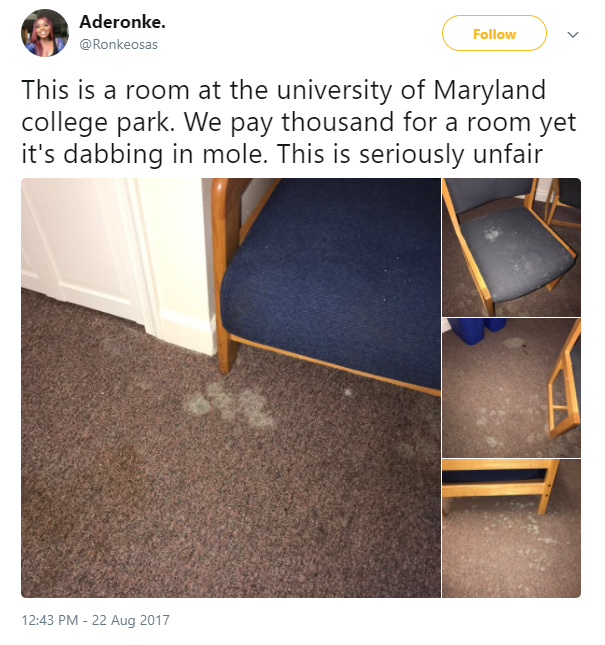A University of Maryland student’s tweet exposing overgrown mold in her Baltimore Hall apartment caused widespread outrage among campus community members, with some even offering to help with the situation.
The students with the affected room have been temporarily relocated while they pull up the carpeting and replace the furniture, said Tracy Kiras, Department of Resident Life’s assistant director of communications and marketing.
This is a room at the university of Maryland college park. We pay thousand for a room yet it’s dabbing in mole. This is seriously unfair pic.twitter.com/70P4H5GbR9
— Aderonke. (@Ronkeosas) August 22, 2017
Residential facilities staff members responded to the students’ concerns rapidly and were on-site within minutes of hearing about it, said Kiras. Service Center staff wiped down everything in the apartment and brought in dehumidifiers to accelerate the drying process.
[Read more: Mold in McKeldin Library’s basement could cost up to $1 million to fix]
University of Maryland SGA President A.J. Pruitt responded within several hours of the tweet, urging the student to reach out to him for help, and affirming that the situation was “unacceptable.”
Chris Moore, assistant director for Residential Facilities’ Administrative Services, advises residents who are dissatisfied with their living spaces to give them a “chance to remedy the situation” before posting it on social media.
“We’re obviously not trying to silence anybody,” Moore said. “But we are here to support our residents at any time of day or night. Any sort of problem that residents encounter in their residence halls, we want to hear about them and make them right.”
A small humid space without any air circulation can easily lead to a buildup of mold, Kiras said.
[Read more: There are about 90 University of Maryland buildings with asbestos]
Service Center staff checked for a source that could have increased moisture in the apartment, but didn’t find anything. However, they did find the apartment’s air conditioning units — which help remove humidity by cooling it — weren’t functioning, so they had to reset them.
Moore suspects other factors contributed to this buildup of mold. The affected apartment is located on the bottom level of Baltimore Hall and is on a grade, so it’s not unlikely it would attract higher levels of humidity than apartments above ground, he said. Because staff members conducted final inspections of all residence facilities in August, Moore said he believes the mold may have developed just days before move-in, which was slated from Aug. 24 to Aug. 27.
“Up until last week, we had people doing last minute work in the [resident] spaces, and obviously our staff did not observe anything out of the ordinary at that point in time,” he said.
Moore said that aside from this, one other group has reported a “musty odor” in their South Hill apartment. He advises residents to avoid running into these problems by adhering to several cardinal rules like cleaning up spills right away, keeping the windows closed and keeping the thermostats between 70 degrees and 74 degrees.
He expects the affected residents of Baltimore Hall to move back in by Labor Day weekend, and said each will be granted a partial housing fee compensation.



